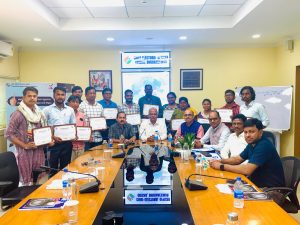v30 – Release notes

For this year’s release notes, I thought I’d do a version of 30 hard won lessons from the past 30 years. This post could just as easily been called a list of things I write about most often on this blog or an extensive list of my notes to self.
1. Success has an intrinsic component (success by our terms) and an extrinsic component (success by the world’s terms). Extrinsic success is a function of us giving the world what it wants. Build a product the world wants and you’ll make more money than can be imagined. Build a product for a niche and you’ll be successful. Do things your customers and managers want and you’ll rise up the ladder.
But, extrinsic success is a hygiene factor. Once you have a threshold amount, it begins to matter less. Intrinsic success, the kind where we believe that we have lived a life well lived, on the other hand, is incredibly hard. It might be possible to fool the world, but it turns out to be impossible to fool the person in the mirror.
2. Money and power amplify what already exists in people. We need less than we think and it doesn’t have the power to make us happy. Some of the most extrinsically successful people are also among the unhappiest. Don’t let the media oversell you on their lives.
Related – it is always worth remembering that the greatest pleasures in life come cheap – the rush of adrenaline after play, a hug, a peaceful shit in a clean bathroom, and a night of sleep in a comfortable and quiet bedroom.
3. We can’t ask people to be grateful or to be humble or to keep a sense of humor. All we can do is help them understand reality. When they (or we) do, gratitude, humility, and a sense of humor follows
4. Emotional intelligence is ignoring what people say and watching what they do.
5. Our networks are proportional to our net worth. There are two kinds of net worth – the first is the kind that is dependent on the presence of power and money. The second is based on the character and connection we accumulate over the course of a life time. One of them is deep and the other is shallow – it turns you can’t buy friends. Or love. The most powerful networks combine both.
6. Integrity comes from the word “integer” which means whole. When we make and keep commitments, we become whole. It is hard. It is is also why our schedule is the truest reflection of our priorities.
7. Happiness is a state. Joy is a feeling. It is possible to feel sad and be happy. Our default state simply reduces the amplitude of our ups and downs and enables us to pay attention to the things that matter most in spite of all the noise. That we use the term “pay” to describe our attention is no accident.
8. Our rate of learning is proportional to what we learn from the people we spend time with (“we are the average of the five people we spend time with”), from reflecting on our own experiences, and from reading/listening to synthesized information. It is not true that we learn more from failure or only from doing. The wisest people simply make it a point to learn from all experience with habitual reflection, analysis, and synthesis.
9. Read books that are just in time instead of just in case. Somewhere along the way, we’ll find a book that changes our life. And, while we’re at it, remember that there is no difference between someone who doesn’t read and someone who can’t.
10. Compound interest is an important principle. Wealth compounds. Learning compounds too. And, as you might imagine, understanding both of these early pays dividends later. :-)
11. Productivity is Focus x intensity x time. Focus = do the right things so you can be effective, intensity = pay attention when you are doing it so you can be efficient.
Similar to compound interest, this relationship between effectiveness and efficiency shows up in many part of our life – focus and intensity, leadership and management. Doing the right things >>> doing things right.
12. Macro patience – micro speed is another principles that shows up in different places. Strategic patience – tactical impatience is a variant too. The idea is simple in theory – set directional goals, focus on process, and be patient. Of course, it is bloody hard to execute. People who focus beyond the next 6 months are the exception, not the rule.
13. Since we’re talking about important principles, the scientific method is one that needs a lot more love because of its wide-ranging applicability. The life implication – treat life as a series of experiments that will each help us gain experience and improve our judgement. As the saying goes, success comes from good judgment. Good judgment comes from experience. Experience comes from bad judgment.
14. Consciousness is the ability to be aware and then to choose. Becoming aware of the actual games being played around us, the real stakes, and the stories we are told go a long way in helping us be effective. To play chess well, we have to have a view of the 64 squares.. Not the 4 around us. It helps to take the time to get both curious and smarter about what is actually going on. You can choose to not play the game – but, understand what the games are.
15. Our success, on average, is largely a function of privilege. The biggest drivers of whatever success we have is typically a result of where we were born and who we were born to (includes what we inherited as well as the love and care we received). Since we can’t change who we were born to, if we want to improve our standing in the world, moving zip codes is the most reliable way to move up the privilege ladder. And, education is the most reliable driver of such movement.
16. The effectiveness of a team is a function of two things – the individuals and the culture. Culture, or the collection of unsaid norms, is strategy in the long run. The best way to set culture is to do so intentionally. And, the best way to do so intentionally is to build the kind of trust that enables honest conversations about it.
Trust, contrary to belief, doesn’t need to take years to develop. It follows knowledge and understanding. Invest in getting to know your team well. That knowledge will lead to understanding why they tick and why they do what they do. Trust follows.
17. The best educators and education do two things – they give us new perspective with which to view the world and inspire us to continue learning for the rest of our life.
18. Adopting a focus on learning/growth mindset is the most important thing we can do – both for our success and happiness. The act of writing about the lessons we learn everyday is the most reliable way I know to cultivate that mindset.
19. Love is the will to extend ourselves for one’s own or another’s growth. Put differently, love means willingly stretching ourselves to grow and enabling those around us to grow. That’s why “be yourself” is bad advice. “Become yourself” is better. Becoming > Being.
20. Take the time to get to know yourself – understand your motives, what you care about, and what your nature is. There is massive benefit to working on things that feel like play to you. You actually give yourself a shot at being the best in the world at it. The best are the best because they’re doing things that feel like play.
21. That said, don’t follow your passion. Just don’t ignore it either. Unless you have a lot of financial runway (see above on privilege), study well in courses that lead you to jobs where you get paid well. Then, keep experimenting toward work that aligns with your nature/passion and purpose. Passion + purpose is a powerful combination.
22. We have two versions of us – our emotional self and our rational self – with the relationship between them being that of an elephant and rider. The rider knows the way but the elephant is way more powerful. So, attempting to persuade ourselves (and others) has to focus on the elephant. Logic drives conclusions, emotions drive action.
23. If we really zoom out, we realize that everything we’ve created is invented. We’ve invented notions like corporations and offices to keep ourselves busy, give ourselves a sense of purpose, find ways to distribute resources, and make it seem fair. These are games we play to get wealth and status. It helps to keep these games in perspective.
24. Our brand is a function of everything we do. The best way to build our brand in the long term is to show up well and do good things that impact others around us in positive ways.
25. Age and wisdom are not correlated. The truly wise have the perspective to rise above the noise of life and continuously focus on what matters. They are the equivalent of life’s athletes as they’ve figured out how to live it well. The best way to spot wisdom is to look at a person’s track record of decisions. And, the best shortcut to wisdom is to simply surround yourself by such folks.
26. From an evolutionary perspective, it is amazing how much of human behavior is driven by our urge to find better mates and have better sex.
27. The list of people who will put their life on hold for extended periods of time when you are in trouble typically begins and ends with our parents, spouse, and, depending on how we do, our kids.
That’s also why marriage, parenting, and the relationship with our parents are three of life’s most challenging learning journeys. They exist for two purposes – to teach us to become better version of ourselves and to remind us that all we have is each other.
28. Airlines tell us to use the oxygen mask for ourselves before doing so for others. For good reason. Take good care of yourself – it is impossible to take care of others otherwise. Consider starting with sleep. Quality sleep makes days look better.
29. Most long term studies on happiness point to one lesson – intrinsic happiness = relationships. We have relationships that stay for a reason, a season, or a lifetime. Many incredibly special relationships last only for a reason or a season. A big part of growing up is seeing them for what they are and letting them go when it is time.
30. Much of our day to day happiness is reality over expectations. Work as hard on that denominator as you do on the numerator.
Birthday bonus 1. Worry and regret are both toxic and useless. You can’t do anything about the future. And, you did the best with what you knew and had. Now that you know better, do better.
Birthday bonus 2. Life is not a race. We share paths with people. But, we are mostly in it on our own. The only worthwhile comparison is us now versus us before now.
Birthday bonus 3. It is better to be thoughtful than smart.
And, a final birthday bonus. The days are long – but, the years are short. And, post kids, the days somehow get much longer and the years get correspondingly shorter. :-)


.jpg)


.jpg)




